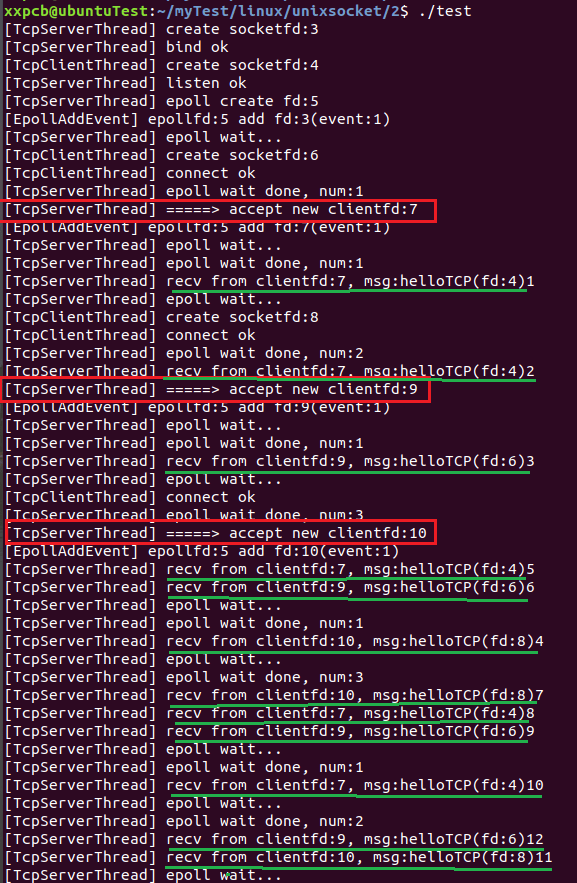-
epoll使用实例:TCP服务端处理多个客户端请求
上篇文章,介绍了Unix域的socket通信,并通过实例测试了TCP和UDP两种传输方式。本篇,在上篇例程的基础上,来学习epoll的多路复用功能,通过给服务端增加epoll监听功能,实现对多个客户端的数据进行接收。
epoll的全称为eventpoll,是linux内核实现IO多路复用的一个实现。epoll是select和poll的升级版,相较于这两个前辈,epoll改进了工作方式,使之更加高效。本篇暂不介绍epoll的内部实现原理,先来介绍如何使用epoll来实现多路复用功能。
1 epoll介绍
1.1 epoll创建
int epoll_create(int size); //监听个数- 1
1.2 epoll事件设置
int epoll_ctl(int epfd, int op, int fd, struct epoll_event *event)- 1
第一个参数epfd是epoll_create()的返回值,
第二个参数op表示动作,用三个宏来表示:-
EPOLL_CTL_ADD:注册新的fd到epfd中;
-
EPOLL_CTL_MOD:修改已经注册的fd的监听事件;
-
EPOLL_CTL_DEL:从epfd中删除一个fd;
第三个参数是需要监听的fd,
第四个参数是告诉内核需要监听什么事,
struct epoll_event结构如下:struct epoll_event { __uint32_t events; /* Epoll events */ epoll_data_t data; /* User data variable */ };- 1
- 2
- 3
- 4
events可以是以下几个宏的集合:
- EPOLLIN :表示对应的文件描述符可以读(包括对端SOCKET正常关闭);
- EPOLLOUT:表示对应的文件描述符可以写;
- EPOLLPRI:表示对应的文件描述符有紧急的数据可读(这里应该表示有带外数据到来);
- EPOLLERR:表示对应的文件描述符发生错误;
- EPOLLHUP:表示对应的文件描述符被挂断;
- EPOLLET: 将EPOLL设为边缘触发(Edge Triggered)模式,这是相对于水平触发(Level Triggered)来说的。
- EPOLLONESHOT:只监听一次事件,当监听完这次事件之后,如果还需要继续监听这个socket的话,需要再次把这个socket加入到EPOLL队列里
1.3 epoll监听
int epoll_wait(int epfd, struct epoll_event * events, int maxevents, int timeout)- 1
等待事件的产生,类似于select()调用。
参数events用来从内核得到事件的集合,
maxevents告之内核这个events有多大,这个maxevents的值不能大于创建epoll_create()时的size,
参数timeout是超时时间(毫秒,0会立即返回,-1将不确定,也有说法说是永久阻塞)。
该函数返回需要处理的事件数目,如返回0表示已超时。2 编程实例测试
本次测试在上篇Unix域socket通信代码的基础上进行修改,只使用TCP方式的socket通信进行测试。
上篇的测试代码,服务端接收到一个客户端的连接后,就仅对该客户端进行服务,没有再接收其它客户端的处理逻辑,本篇要实现的,就是一个服务端,能够接收多个客户端的数据。
编程之前,先来看下要实现的程序结构,其中黄色的部分为本篇在上篇例程的基础上,需要增加的部分。

只需对服务端程序进行修改,添加epoll监听功能,客户端程序不需要修改。
2.1 为socket服务端增加epoll监听功能
TCP服务端的代码修改后如下,主要的修改在listen之后,创建一个epoll,然后把服务端的socketfd加入epoll进行监听:
- 当有新的客户端请求连接时,服务端的socketfd会收到事件,进而epoll会收到服务端socketfd的EPOLLIN事件,此时可以让服务端接受客户端的请求,并把创建的客户端fd也加入到epoll进行监听
- 当客户端连接成功并被epoll监听后,客户端再发消息过来,epoll就会收到对应客户端fd的EPOLLIN事件,此时可以让服务端读取客户端的消息
#define LISTEN_MAX 5 #define EPOLL_FDSIZE LISTEN_MAX #define EPOLL_EVENTS 20 #define CLIENT_NUM 3 void EpollAddEvent(int epollfd, int fd, int event) { PRINT("epollfd:%d add fd:%d(event:%d)\n", epollfd, fd, event); struct epoll_event ev; ev.events = event; ev.data.fd = fd; epoll_ctl(epollfd, EPOLL_CTL_ADD, fd, &ev); } void TcpServerThread() { //------------socket int sockfd = socket(AF_UNIX, SOCK_STREAM, 0); if (sockfd < 0) { PRINT("create socket fail\n"); return; } PRINT("create socketfd:%d\n", sockfd); struct sockaddr_un addr; memset (&addr, 0, sizeof(addr)); addr.sun_family = AF_UNIX; strcpy(addr.sun_path, UNIX_TCP_SOCKET_ADDR); //------------bind if (bind(sockfd, (struct sockaddr *)&addr, sizeof(addr))) { PRINT("bind fail\n"); return; } PRINT("bind ok\n"); //------------listen if (listen(sockfd, LISTEN_MAX)) { PRINT("listen fail\n"); return; } PRINT("listen ok\n"); //------------epoll--------------- int epollfd = epoll_create(EPOLL_FDSIZE); if (epollfd < 0) { PRINT("epoll create fail\n"); return; } PRINT("epoll create fd:%d\n", epollfd); EpollAddEvent(epollfd, sockfd, EPOLLIN); struct epoll_event events[EPOLL_EVENTS]; while(1) { PRINT("epoll wait...\n"); int num = epoll_wait(epollfd, events, EPOLL_EVENTS, -1); PRINT("epoll wait done, num:%d\n", num); for (int i = 0;i < num;i++) { int fd = events[i].data.fd; if (EPOLLIN == events[i].events) { //接受客户端的连接请求 if (fd == sockfd) { //------------accept int clientfd = accept(sockfd, NULL, NULL); if (clientfd == -1) { PRINT("accpet error\n"); } else { PRINT("=====> accept new clientfd:%d\n", clientfd); EpollAddEvent(epollfd, clientfd, EPOLLIN); } } //读取客户端发来的数据 else { char buf[BUF_SIZE] = {0}; //------------recv size_t size = recv(fd, buf, BUF_SIZE, 0); //size = read(clientfd, buf, BUF_SIZE); if (size > 0) { PRINT("recv from clientfd:%d, msg:%s\n", fd, buf); } } } } } PRINT("end\n"); }- 1
- 2
- 3
- 4
- 5
- 6
- 7
- 8
- 9
- 10
- 11
- 12
- 13
- 14
- 15
- 16
- 17
- 18
- 19
- 20
- 21
- 22
- 23
- 24
- 25
- 26
- 27
- 28
- 29
- 30
- 31
- 32
- 33
- 34
- 35
- 36
- 37
- 38
- 39
- 40
- 41
- 42
- 43
- 44
- 45
- 46
- 47
- 48
- 49
- 50
- 51
- 52
- 53
- 54
- 55
- 56
- 57
- 58
- 59
- 60
- 61
- 62
- 63
- 64
- 65
- 66
- 67
- 68
- 69
- 70
- 71
- 72
- 73
- 74
- 75
- 76
- 77
- 78
- 79
- 80
- 81
- 82
- 83
- 84
- 85
- 86
- 87
- 88
- 89
- 90
- 91
- 92
- 93
- 94
- 95
- 96
- 97
- 98
- 99
- 100
- 101
- 102
2.2 启动多个客户端进行测试
修改主程序,创建多个客户端线程,产生多个客户端,去连接同一个服务端,来测试epoll监听多个事件的功能。
int main() { unlink(UNIX_TCP_SOCKET_ADDR); //创建一个服务端 thread thServer(TcpServerThread); //创建多个客户端 thread thClinet[CLIENT_NUM]; for (int i=0; i- 1
- 2
- 3
- 4
- 5
- 6
- 7
- 8
- 9
- 10
- 11
- 12
- 13
- 14
- 15
- 16
- 17
- 18
- 19
- 20
本例中,CLIENT_NUM为3,使用3个客户端来测试epoll功能。
2.3 测试结果
在Ubuntu上编译运行,程序运行时的打印如下:
[TcpServerThread] create socketfd:3 [TcpServerThread] bind ok [TcpClientThread] create socketfd:4 [TcpServerThread] listen ok [TcpServerThread] epoll create fd:5 [EpollAddEvent] epollfd:5 add fd:3(event:1) [TcpServerThread] epoll wait... [TcpClientThread] create socketfd:6 [TcpClientThread] connect ok [TcpServerThread] epoll wait done, num:1 [TcpServerThread] =====> accept new clientfd:7 [EpollAddEvent] epollfd:5 add fd:7(event:1) [TcpServerThread] epoll wait... [TcpServerThread] epoll wait done, num:1 [TcpServerThread] recv from clientfd:7, msg:helloTCP(fd:4)1 [TcpServerThread] epoll wait... [TcpClientThread] create socketfd:8 [TcpClientThread] connect ok [TcpServerThread] epoll wait done, num:2 [TcpServerThread] recv from clientfd:7, msg:helloTCP(fd:4)2 [TcpServerThread] =====> accept new clientfd:9 [EpollAddEvent] epollfd:5 add fd:9(event:1) [TcpServerThread] epoll wait... [TcpServerThread] epoll wait done, num:1 [TcpServerThread] recv from clientfd:9, msg:helloTCP(fd:6)3 [TcpServerThread] epoll wait... [TcpClientThread] connect ok [TcpServerThread] epoll wait done, num:3 [TcpServerThread] =====> accept new clientfd:10 [EpollAddEvent] epollfd:5 add fd:10(event:1) [TcpServerThread] recv from clientfd:7, msg:helloTCP(fd:4)5 [TcpServerThread] recv from clientfd:9, msg:helloTCP(fd:6)6 [TcpServerThread] epoll wait... [TcpServerThread] epoll wait done, num:1 [TcpServerThread] recv from clientfd:10, msg:helloTCP(fd:8)4 [TcpServerThread] epoll wait... [TcpServerThread] epoll wait done, num:3 [TcpServerThread] recv from clientfd:10, msg:helloTCP(fd:8)7 [TcpServerThread] recv from clientfd:7, msg:helloTCP(fd:4)8 [TcpServerThread] recv from clientfd:9, msg:helloTCP(fd:6)9 [TcpServerThread] epoll wait... [TcpServerThread] epoll wait done, num:1 [TcpServerThread] recv from clientfd:7, msg:helloTCP(fd:4)10 [TcpServerThread] epoll wait... [TcpServerThread] epoll wait done, num:2 [TcpServerThread] recv from clientfd:9, msg:helloTCP(fd:6)12 [TcpServerThread] recv from clientfd:10, msg:helloTCP(fd:8)11 [TcpServerThread] epoll wait... [TcpServerThread] epoll wait done, num:3 [TcpServerThread] recv from clientfd:10, msg:helloTCP(fd:8)14 [TcpServerThread] recv from clientfd:7, msg:helloTCP(fd:4)13 [TcpServerThread] recv from clientfd:9, msg:helloTCP(fd:6)15 [TcpServerThread] epoll wait... [TcpServerThread] epoll wait done, num:3 [TcpServerThread] recv from clientfd:10, msg:helloTCP(fd:8)16 [TcpServerThread] recv from clientfd:7, msg:helloTCP(fd:4)17 [TcpServerThread] recv from clientfd:9, msg:helloTCP(fd:6)18 [TcpServerThread] epoll wait...- 1
- 2
- 3
- 4
- 5
- 6
- 7
- 8
- 9
- 10
- 11
- 12
- 13
- 14
- 15
- 16
- 17
- 18
- 19
- 20
- 21
- 22
- 23
- 24
- 25
- 26
- 27
- 28
- 29
- 30
- 31
- 32
- 33
- 34
- 35
- 36
- 37
- 38
- 39
- 40
- 41
- 42
- 43
- 44
- 45
- 46
- 47
- 48
- 49
- 50
- 51
- 52
- 53
- 54
- 55
- 56
- 57
- 58
对结果标注一下,更容易理解程序运行过程:

可以看到,服务端依次接受了3个客户端的连接请求,然后可以接收3个客户端发来的数据。
3 总结
本篇介绍了linux软件开发中,epoll功能的使用,通过对TCP服务端增加epoll功能,实现一个服务端来处理多个客户端的功能。
基于深度学习的文本分类案例:使用LSTM进行情绪分类
虚拟机下面安装Centos7的详解
四级单词大全h-n
基于 Openzeppelin 的可升级合约解决方案的注意事项
Flutter中 ElevatedButton取代RaisedButton
如何去掉css 渐变时的锯齿效果
南大通用数据库-Gbase-8a-学习-10-Gbase8a通过Dblink访问Oracle
MATLAB小技巧(21)矩阵分析--偏最小二乘回归
Flink日志收集到数据库/kafka
